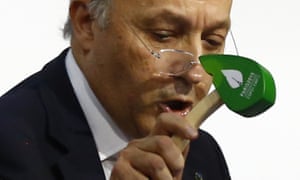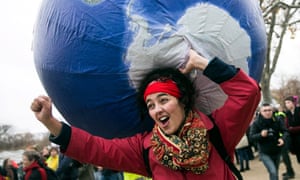Extract from The Guardian
Two decades of talks have come to this: an
ambitious agreement to hold states to emissions targets – but
already low-lying countries are worried
French foreign minister and president of the talks
Laurent Fabius brings down the gavel to mark the adoption of the
agreement. Photograph: Francois Mori/AP
Sunday 13 December 2015 04.19 AEDT
Governments have signalled an end to the fossil
fuel era, committing for the first time to a universal agreement to
cut greenhouse gas emissions and to avoid the most dangerous effects
of climate change at crunch UN talks in Paris.
After 20 years of fraught meetings, including the
past two weeks spent in an exhibition hall on the outskirts of Paris,
negotiators from nearly 200 countries signed on to a deal on Saturday
evening that set ambitious goals to limit temperature rise and to
hold governments to account for reaching those targets.
After an anxious two-hour wait for the final
plenary session to begin, Laurent Fabius, the French foreign
minister, who was chairing the meeting, invited delegates to adopt
the agreement. After looking up briefly, he brought down the gavel to
widespread applause and cheering, signifying the deal had been
formally agreed. “It is a small gavel but I think it can do a great
job,” he said once the applause had died down.
François Hollande, the French president, appealed
to negotiators to approve the 31-page text, and said countries had a
rare chance to make history. “We are at a decisive point in time,”
he said.
Fabius: ‘The world is counting on Paris climate
talks’
Fabius said: “It is my deep conviction that we
have come up with an ambitious and balanced agreement. Today it is a
moment of truth.”
Miguel Arias Cañete, the EU’s climate
commissioner, hailed the historic deal. “It is solid,” he said.
“We can build on it. The deal is ambitious, balanced and robust.”
Al Gore, who was in the hall and appeared visibly
moved when the agreement was gavelled in, said the accord would have
a powerful effect on the economy.
“This universal and ambitious agreement sends a
clear signal to governments, businesses, and investors everywhere:
the transformation of our global economy from one fueled by dirty
energy to one fueled by sustainable economic growth is now firmly and
inevitably underway,” Gore said in a statement.
“No agreement is perfect, and this one must be
strengthened over time, but groups across every sector of society
will now begin to reduce dangerous carbon pollution through the
framework of this agreement.”
Six years after the chaotic collapse of the
Copenhagen climate summit, the agreement now known as the Paris
Outcome for the first time commits rich countries, rising economies
and some of the poorest countries to work together to fight climate
change.
Under the deal, adopted by consensus, all
countries agreed to reduce emissions. Rich countries agreed to raise
$100bn (£66bn) a year by 2020 to help poor countries transform their
economies. The overall agreement is legally binding, but some
elements – including the pledges to curb emissions by individual
countries and the climate finance elements – are not.
Government and business leaders said the
agreement, which set a new goal to by the end of the century, sent a
powerful signal to business that the fossil fuel era was coming to an
end.
The International Investors Group on Climate
Change, a network managing €13tn of assets, said the decision would
help trigger a shift away from fossil fuels and encourage greater
investments in renewable energy
“Investors across Europe will now have the
confidence to do much more to address the risks arising from high
carbon assets and to seek opportunities linked to the low carbon
transition already transforming the world’s energy system and
infrastructure,” the group said.
Jennifer Morgan, of the environmental think tank
the World Resources Institute, said the long term goal was
“transformational” and “sends signals into the heart of the
markets”.
The deal set a high aspirational goal to limit
warming below 2C and strive to keep
temperatures at 1.5C above pre-industrial levels – a far more
ambitious target than expected, and a key demand of vulnerable
countries.
It incorporates previous commitments from 186
countries to reduce emissions, which on their own would only hold
warming to between 2.7C and 3C.
A climate demonstrator in Paris on Saturday.
Photograph: Etienne Laurent/EPA
But it sets out procedures for review at regular
intervals to deepen emissions cuts, with countries aiming to peak
global greenhouse gas emissions as soon as possible, and then rapidly
scale down in the second half of this century.
Critics said the agreement would still condemn
hundreds of million of people living in low-lying coastal areas and
small islands. But supporters said the negotiations took a
significant step forward in getting countries to act together on a
global challenge of immense complexity, and in sending a signal to
global markets.
Saturday’s agreement was the product of years of
preparation, two weeks of intense negotiations, capped off by three
sleepless nights, with Barack Obama and Hollande phoning other
leaders to bring them on side with the deal.
Accounts from behind the closed doors of
negotiating session described tense exchanges between oil-producing
countries, such as Saudi Arabia and Russia, and a rapidly constituted
US- and Europe-backed High Ambition Coalition, which kept up the
pressure for a strong temperature goal and regular reviews of
emission-cutting plans.
COP21en (@COP21en) December 12, 2015
#ParisAgreement
is adopted in #Paris
at #COP21!
#GoCOP21
pic.twitter.com/9wCxyshWa7
The French hosts also won praise from negotiators
for using a mixture of informal huddles, or indabas, and traditional
shuttle diplomacy to bring the deal home.
The text commits countries to peak greenhouse gas
emissions as soon as possible, and to seek a balance between
human-caused emissions and removals by carbon sinks.
“This means bringing down greenhouse gas
emissions to net zero within a few decades,” said John
Schellnhuber, director of the Potsdam Institute for Climate Impact
Research, and a climate adviser to the Vatican.
But he added that countries would have to move
aggressively, peaking before 2030 and eliminating emissions by 2050
through reforestation and technologies such as carbon capture and
storage.
For vulnerable countries, the high ambition of the
1.5C goal was offset by the weakening of the agreement when it came
to dealing with irreparable damage of climate change.
Negotiators and campaigners said pressure from the
US and European Union stripped the agreement of language that would
have opened up new sources of funding for small islands and low-lying
states that could experience irreversible damage due to climate
change.
“The idea of even discussing loss and damage now
or in the future was off limits. The Americans told us it would kill
the COP,” said Leisha Beardmore, the chief negotiator for the
Seychelles. “They have always been telling us: ‘Don’t even say
that’.”
Even so, campaign groups were broadly positive
about the outcome. Given intense pressure from oil-producing
countries, negotiators managed to craft a text that was far more
ambitious than expected.
The universal nature of the agreement was a
radical departure from the Kyoto Protocol, the 1997 agreement that
drew sharp divisions between the obligations of wealthy and
developing countries but ultimately failed to lower emissions.
Unlike Kyoto, the agreement reached on Saturday
depends on political will, with countries setting their own climate
action plans.
Rich countries promised that by 2025 they would
set a new goal for climate finance “from a floor of $100bn per
year”, the figure first pledged at the Copenhagen climate talks six
years ago. However, the commitment was offered as a non-binding
decision that accompanied the binding text.
All the countries agreed on demands from the US
and European Union for five-year reviews of their emissions
reductions – an exercise that had been resisted by China.


No comments:
Post a Comment